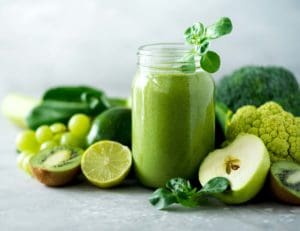When a person thinks of “juice,” pictures of oranges or apples likely come to mind. However, today’s juices go well beyond those traditional selections. A walk down the beverage aisle in any modern supermarket will provide numerous options for fruit, vegetable, and fruit-vegetable blended juices. With all of those options at easy reach, what is the best beverage to supplement a healthy diet?
Fruit Juices
Orange and apple juices are common beverages for young and old alike and often compliment a delicious morning breakfast or on-the-go lunch. Fruits contain fructose, a naturally occurring sugar that the body craves. The manufacturing process varies greatly for these types of beverages creating a large spectrum of health worthiness. In general, healthier options will contain 100% pure fruit content, low sugar levels, and naturally occurring fiber.
Cherry juice is an example of a nutrient-rich beverage with low sugar content. Cherries are high in nutrients such as potassium and iron. Potassium helps to maintain blood pressure, provide hydration, increase muscle recovery, aid in digestion, maintain pH balance, and level heart rates. Tart cherry juice in particular contains a significant amount of anthocyanins compared to other cherry juices, and provide valuable anti-inflammatory benefits to the body.
Vegetable Juices
 These days just about any vegetable can be processed into a beverage including carrots, beets, spinach, kale, and broccoli. Many consumers enjoy these drinks because it’s an easy way to add vegetables to a diet for those who don’t really enjoy eating them. Vegetables have important vitamins and minerals our bodies need and contain significantly lower amounts of sugar. As with fruits, vegetable juices containing natural fibers are healthier options.
These days just about any vegetable can be processed into a beverage including carrots, beets, spinach, kale, and broccoli. Many consumers enjoy these drinks because it’s an easy way to add vegetables to a diet for those who don’t really enjoy eating them. Vegetables have important vitamins and minerals our bodies need and contain significantly lower amounts of sugar. As with fruits, vegetable juices containing natural fibers are healthier options.
Kale is a popular ingredient for healthy juices and smoothies because of its high content of antioxidants like beta-carotene. This vegetable is filled with several key nutrients including vitamins A, C, and K. Some people have experienced lower LDL (‘bad’) cholesterol and higher HDL (‘good’) cholesterol levels leading to a decreased risk of heart disease.
Another popular vegetable juice contains beets. Beets are filled with manganese, potassium, folate, and nitrates. Studies have shown that consuming nitrate-rich foods like beets may lead to improved blood pressure and brain performance.
Which should you choose?
There is no one choice that is best for all. It’s a good idea to talk with your health practitioner about your health goals and obtain specific advice about fruits or vegetables that may benefit your body’s needs. Regardless of your choice, moderate your intake of any beverage based on its specific nutritional content and caloric makeup, and never substitute juices for whole fruits and vegetables.



Leave a Reply